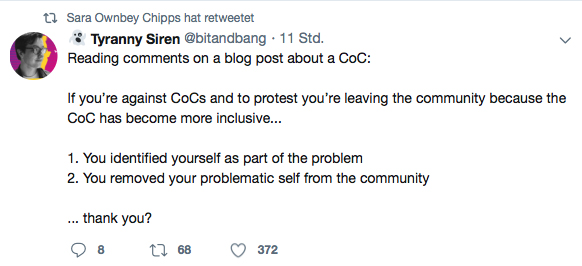While Ms. Chipps did not write this herself, she did actively retweet it
without commenting on it;
and considering her official capacity – this is very close to being a statement of the company's position on the matter.
I will state the obvious and say that:
- The question of whether the Code of Conduct has "become more inclusive" is, at best, a highly contested claim.
- Almost no critics of the new Code of Conduct changes believe it has "become more inclusive".
- The reasons for protesting and for leaving aren't excessive or insufficient "inclusivity", but rather coercion, authoritarianism and bad faith on the part of SE Inc.
and the above holds regardless of whether one agrees with the criticism, or whether one believes the CoC changes are called for. Moreover, relevant SE Inc. staff is quite aware of the above.
It is therefore, in my opinion, quite offensive for an SE Inc. official such as Ms. Chipps to have chosen to misrepresent the situation and the company's critics with this retweet.
I stumbled into this question due to the bounty asking which is
Looking for an answer drawing from credible and/or official sources.
Firstly, it seems that this is not a statement reflective of company policy, it has not been endorsed more explicitly by the company and Shog9 wrote in a comment under your question:
I'm leaving this here for Sara to respond to if she wants to, but I don't see anything useful coming out of it otherwise.
As such, it seems to be a retweet made by Ms. Chipps in a personal capacity. Furthermore, I will assume that Ms. Chipps is aware of this question's existence, given its two week anniversary today. If she really stood by it, she has had ample time to double down, for example by endorsing the contents of the tweet once more in an answer here.
While I cannot look into Ms. Chipps head, I can look on her blog which I think has a relevant article on forgiveness. I will quote a liberal chuck (but not all) of her blog post, so as not to misrepresent her words. I have emphasised a few words which I will refer back to in tying this back to the question at hand.
There is one trait, and besides the many good people that surround me it is the only thing that has kept me away from succumbing to the dangers of my temperament. That trait is the ability to forgive myself, even when it seems unbearable.
Very often, I do things that are extremely stupid. I think no matter what our personality type that happens to us every so often. I make a bad call when designing a product that hindsight shows me from a mile away, I put off a client with a sloppy email or a poor follow up, I miscalculate my monthly income in an astronomical way, or I drop my iPhone 4 on cement while running down the street in heels (for absolutely no good reason besides being dared or trying to catch an ice cream truck). Things like this used to cause me much pain, and stop me in my tracks unable to go forward from the shame I felt and the voice in my head telling me I should have known so much better. There would be absolutely no forward progress while I berated myself, sometimes looking in the mirror and asking repeatedly how it was possible for one person to be so stupid.
Time and experience taught me that if I kept up that type of behavior it not only would retard my progress it would endanger my ability to run my business and follow my career goals. I've learned to forgive myself no matter how spectacularly I fail, and that has enabled me to accomplish things and get to places that only existed in my wildest dreams of the future.
Many tout the benefits of "getting over it" and "moving on", however, I think the only way to describe this process is forgiveness. You are angry at yourself, for hurting yourself; just as you would be angry at someone else for hurting you. You let yourself down, you should have known better, and you were inconsiderate of your own needs, yet again. If we can't get past these emotions of guilt, anxiety, and discomfort we can't look back and gain what we can use from the experience.
Based on this, I think Ms. Chipps has simply moved on. Perhaps she doesn't think an explanation is necessary, or perhaps she thinks a discussion on this will be hurtful and not constructive.
While I still think it would be helpful for Ms. Chipps to explain her reasoning with respect to this question. Alas, I think this may be what we will have to settle for.
Edit: in the blog post, too, the reasons for apologizing are not limited to cases that only hurt Ms. Chipps.
Of course an even different reason may be of the law of the holes variety. As someone who's paid attention to different crises, I'd say that's a reasonable position for Ms. Chipps and the company to take. The number of people that are really upset isn't that big*, so they may just think they can wait out the storm. After all, people are only upset for so long until they leave or lose interest in being upset, either way, they won't be much of nuisance (to the leadership) in six to eight weeks.
*though it does include me, no need to downvote for that ;)

